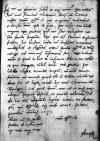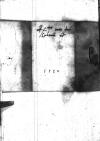Cum mitterem hunc meum servitorem Thorn (Toruń, Thorunium), city in northern Poland, on the Vistula river in its lower reaches, main residence of the bishops of Kulm (Chełmno); one of the three Great Prussian Cities (along with Gdańsk and Elbing) which had representatives in the Council of Royal Prussia; a member of the Hanseatic League⌊ThoruniumThorn (Toruń, Thorunium), city in northern Poland, on the Vistula river in its lower reaches, main residence of the bishops of Kulm (Chełmno); one of the three Great Prussian Cities (along with Gdańsk and Elbing) which had representatives in the Council of Royal Prussia; a member of the Hanseatic League⌋, commisi illi cum primis visere Vestram Reverendissimam Dominationem, cui et optimam valetudinem et fausta omnia opto et precor, pro misso vero probably Ioannes Campensis (Jan Van Campen), Psalmorum omnium iuxta Hebraicam veritatem paraphrastica interpretatio, autore Ioanne Campensi, publico, cum nasceretur primum et absolueretur, Louanii Hebraicarum literarum professore. Reuerendissimo Domino Ioanni Dantisco Episcopo Culmensi etc. Dedicata, Cracovia, Florianus UNGLER, 1532-11-18 ⌊libelloprobably Ioannes Campensis (Jan Van Campen), Psalmorum omnium iuxta Hebraicam veritatem paraphrastica interpretatio, autore Ioanne Campensi, publico, cum nasceretur primum et absolueretur, Louanii Hebraicarum literarum professore. Reuerendissimo Domino Ioanni Dantisco Episcopo Culmensi etc. Dedicata, Cracovia, Florianus UNGLER, 1532-11-18 ⌋ magnas ago gratias, quem nec sine fructu frequenter lego. Qui nisi Cracow (Kraków, Cracovia), city in southern Poland, Małopolska, on the Vistula river, from 1038 capital of the Kingdom of Poland⌊CracoviaeCracow (Kraków, Cracovia), city in southern Poland, Małopolska, on the Vistula river, from 1038 capital of the Kingdom of Poland⌋ imprimeretur, fecissem hic imprimi, habeo enim impressorem et caracteres multiplices et elegantes.
Ceterum audio Reverendissimam Dominationem Vestram accingi ad munus consecrationis suae. Rogo, indicet mihi, si quid in hac re inserviri sibi a me velit et quo tempore. Nihil mihi erit gratius.
Pro probably Ioannes Campensis (Jan Van Campen), Psalmorum omnium iuxta Hebraicam veritatem paraphrastica interpretatio, autore Ioanne Campensi, publico, cum nasceretur primum et absolueretur, Louanii Hebraicarum literarum professore. Reuerendissimo Domino Ioanni Dantisco Episcopo Culmensi etc. Dedicata, Cracovia, Florianus UNGLER, 1532-11-18 ⌊libelloprobably Ioannes Campensis (Jan Van Campen), Psalmorum omnium iuxta Hebraicam veritatem paraphrastica interpretatio, autore Ioanne Campensi, publico, cum nasceretur primum et absolueretur, Louanii Hebraicarum literarum professore. Reuerendissimo Domino Ioanni Dantisco Episcopo Culmensi etc. Dedicata, Cracovia, Florianus UNGLER, 1532-11-18 ⌋ eleganti remitto probably Andrzej Krzycki, De ratione et sacrificio Missae Andreas Cricius Episcopus Plocensis, Cracovia, Mathias Scharffenbergk, 1529 ⌊ineptumprobably Andrzej Krzycki, De ratione et sacrificio Missae Andreas Cricius Episcopus Plocensis, Cracovia, Mathias Scharffenbergk, 1529 ⌋, nonnihil tamen facientem ad munus, quod illi iam tandem obeundum est. Dicet, scio, cum leget: unde haec nunc Charikenos (Charicenus), an asthmatic old man, one of the characters from Pseudo-Lucianus' dialogue Philopatris ⌊CharicennoCharikenos (Charicenus), an asthmatic old man, one of the characters from Pseudo-Lucianus' dialogue Philopatris ⌋ illi Theologia? Sed quid faciam, cum iam et Muses Greek goddesses of literature and the arts⌊MusaeMuses Greek goddesses of literature and the arts⌋ parum alioqui propitiae deserunt, et puellae abhorrent? Sed de his coram aliquando laxius.
Interim me fraternae gratiae Vestrae Reverendissimae Dominationis ex corde commendo.


 AAWO, AB, D.67, f. 153v
AAWO, AB, D.67, f. 153v